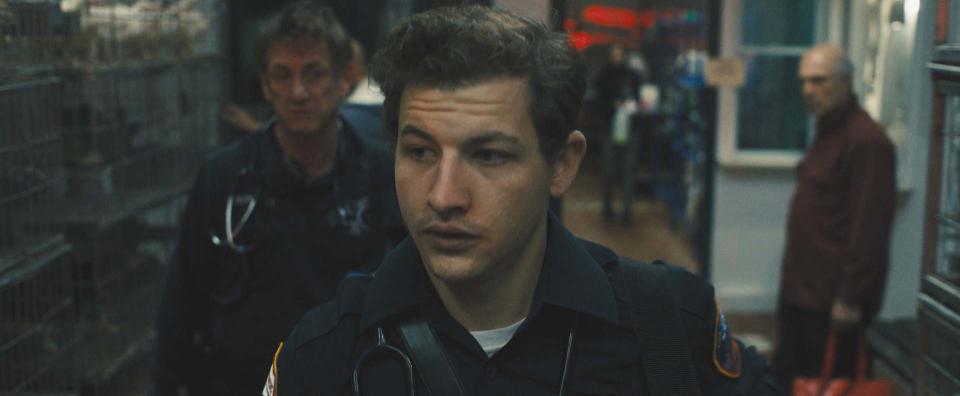'Asphalt City' is a gory look at the worst side of humanity. And yeah, you should watch it
- Oops!Something went wrong.Please try again later.
“St. Michael the Archangel, defend us in battle,” the words of this prayer set the tone for the intense human drama in “Asphalt City.”
French-born director Jean-Stéphane Sauvaire is not afraid to show the harshness and tragedies of human life as is evidenced by his previous works. In 2008 he directed a story about child soldiers in Africa called “Johnny Mad Dog.” In 2017, he put to film the true story of an English boxer who ended up in one of the most notorious prisons in Thailand in "A Prayer Before Dawn."
All of these films, including “Asphalt City,” flinch from violence. However, what Sauvaire shows in these films is the intense human emotions that infuse these dramatic action movies.
What is 'Asphalt City' about?
On the surface, “Asphalt City” is the story about a rookie paramedic in New York City. He sees humanity at its most vulnerable. And often at its worst.

Ollie Cross (Tye Sheridan) moved from Colorado to New York to become a paramedic. But it’s just a stop-gap, as his long-term goal is to become a doctor. Having failed the medical school admission test, he seeks some real-world medical experience while studying for the exam again. But it might be more than Ollie bargained for.
The film opens with a chaotic rush to a crime scene where several people, presumably rival gangs, have shot at each other. It’s Ollie’s first time seeing such open and gruesome violence. Tensions are high. People are shouting, screaming, and he freezes up. It’s not until Gene Rutkovsky, played by a rough and toughened Sean Penn, snaps him out of it that he’s somewhat able to do his job.
Like Ollie, the viewer is thrown headfirst into medical emergency after emergency. It’s hard to keep your head up. Like Ollie, you’re left dazed by the end.
Gene takes Ollie under his wing, sort of. Paired together, they respond to calls for drug overdoses, shootings, drunkenness, disorderly conduct with a medical concern, domestic violence and so much more. In all these situations, Ollie and Gene are faced with people shouting and screaming profanities. It’s a lot to take in.
Then there are moments of quiet, where Gene and Ollie are just eating lunch in the front of the ambulance, shooting the breeze with dark humor. After witnessing so much horror, it seems that one has to develop a thick skin. Or at least that’s the message Ollie gets.
There’s a scene in a halal butcher shop that seems to underscore the brutishness of humanity. A man with asthma is coding on the floor. His relative — it’s unclear if she’s a wife or daughter — is there translating for the man until he loses consciousness. Ollie has to intubate fast. Time is running out. And yet behind the distressful scene, a young man continues to butcher an animal. Its guts fall out with a splat on the floor, its tongue lolling out of its head, dead eyes staring. It’s as if the butcher is disconnected from the traumatic scene happening in front of him.
This movie plays with volume
One thing to note throughout the movie is Sauvaire’s use of sound. It’s often loud, chaotic and it’s hard to hear the dialogue. Other times it’s quiet. All you hear is Ollie’s breathing. Then there’s the sound of flies, harbingers of a death scene.
It can be hard to make sense of the story when the sound mixing is so intense. However, it does make the immersion into the world of paramedics more complete. The sound is a character in itself. And whether it's the sensory overload of a 911 call or the sudden dearth of noise, it leaves you reeling alongside Ollie.
Director Jean-Stéphane Sauvaire's films are not for the faint of heart
If you cannot tolerate violence and gore, then “Asphalt City” will be a very hard watch. But it is worth seeing. While the human drama plays out on the screen, Ollie, Gene and every other paramedic are fighting their own internal demons.
Religious undertones are everywhere. Ollie has a red leather jacket with gold angel wings that spread from the shoulders down to his arms. It mirrors the Byzantine icon of the saint, shown in Roman-style armor spearing a dragon that is lying in flames — a depiction of the devil, a fallen angel.
There are images of the Virgin Mary, Buddha and religious references throughout, like when an Arabic speaking father says: “It’s God’s will if he lives,” as his young son has a seizure on the floor.
At another point, Ollie is forced to enter an apartment where a woman had died some days before. It’s unclear how long. But she is well into a state of decomposition. Anyone who’s smelled death will immediately be triggered. But in the absence of smell, the audience gets sound. Millions of flies just buzzing and buzzing, get louder and louder — the sound of death.
Ollie continues to fall into this hellish nightmare of a career until he gets to a breaking point.
His moment of redemption is small and subtle in a film that is anything but.
'Asphalt City' 4 stars
Great ★★★★★ Good ★★★★
Fair ★★★ Bad ★★ Bomb ★
Director: Jean-Stéphane Sauvaire
Cast: Tye Sheridan, Sean Penn, Mike Tyson
Rating: R, Violent Content | Sexual Content | Disturbing/Bloody Images | Pervasive Language |Graphic Nudity | Suicide
How to watch: In theaters March 29
Contact Kaely Monahan at kaely.monahan@arizonarepublic.com. Follow her on our podcasts Valley 101 and The Gaggle, and X, formerly known as Twitter, @KaelyMonahan.
This article originally appeared on Arizona Republic: 'Asphalt City' review: Paramedic drama is not for the faint of heart

